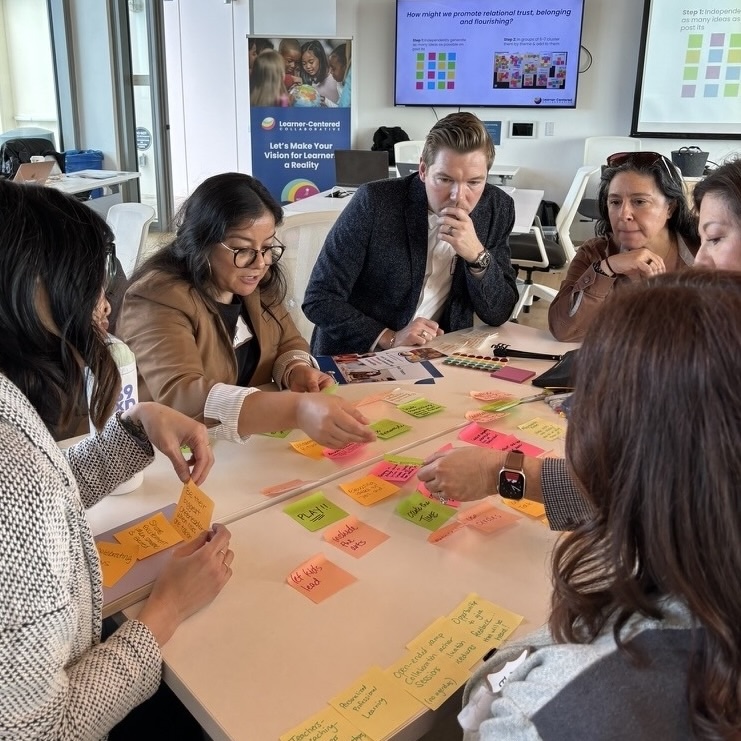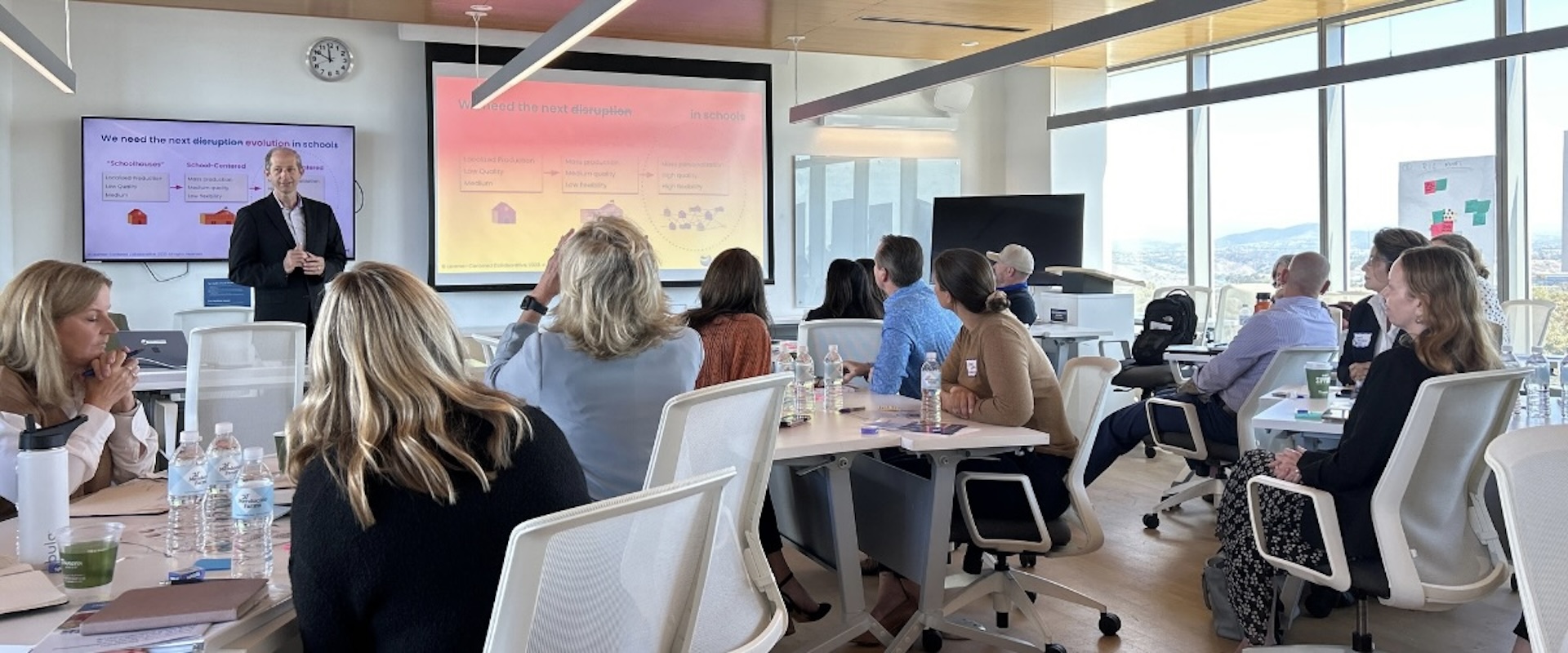SoCal LINK Leverages the Power of a Triangle to Transform Schools
UC San Diego researchers, local educators and community partners join forces to advance learner-centered education in PreK-12 classrooms across Southern California
Story by:
Media contact:
Published Date
Story by:
Media contact:
Topics covered:
Share This:
Article Content
A triangle is one of the strongest shapes, said Education Studies professor Alan J. Daly at the first meeting of the Southern California Learning in Networked Knowledge initiative, or SoCal LINK. But he wasn’t beginning a geometry lesson. He was emphasizing the power of bringing together three distinct groups — UC San Diego researchers, community partners, and PreK-12 educators — to shape the future of education.
SoCal LINK is a research-practice partnership between the Department of Education Studies at UC San Diego, the nonprofit Learner-Centered Collaborative (LCC), and local teachers and administrators. Inspired by earlier successful partnerships, Education Studies faculty Daly, Amanda Datnow, and postdoctoral researcher Marie Lockton, an Education Studies doctoral alum and former teacher, co-launched SoCal LINK with LCC in Fall 2023.
Each quarter since, representatives from all three sides of the triangle have met at UC San Diego’s Social Sciences Public Engagement Building to expand learner-centered education in Southern California.
“Learner-centered education is authentic, empowering, and cultivates student agency. In a learner-centered classroom, students are engaged in meaningful learning experiences that connect to future goals,” Datnow said.
Bridging Gaps Between Research and Practice
Research is often seen as too slow or abstract to meet the immediate and pressing needs of people on the ground. Research-practice partnerships (RPPs) help bridge this gap by aligning research with real-world problems.
The Department of Education Studies has long engaged in RPPs with local districts to ensure their research is timely and relevant. Educators across the U.S. face pressure to prepare students for a changing world while also addressing post-pandemic challenges like learning loss, absenteeism, and social-emotional wellbeing. Many promising solutions remain siloed, however, with limited broader impact.
SoCal LINK aims to change that. The partnership creates a space for educators, researchers, and community leaders to exchange knowledge and co-develop evidence-based practices.
Daly, who previously worked as a teacher, school psychologist, and administrator for 16 years before his career as a professor for the past 19 years, said he began collaborating with schools well before the term “research-practice partnership” was coined. His research focuses on how trust-based relationships and interdependence in education systems not only support the exchange of ideas and resources but also enable positive change.

"I always wanted my work to make a difference in the lives of practitioners, and I always knew that my scholarly life was deeply informed by my own practice experience and the experience of the amazing educators I had the privilege to work alongside," he said.
Datnow, who serves as Chancellor’s Associates Endowed Chair in Education Studies and associate dean of the School of Social Sciences, has also led RPPs. One longstanding project with Vista Unified School District, launched nearly a decade ago, has produced a number of different valuable findings about children’s development across school and home which have important implications for teaching and learning, including how welcoming a student’s home language into the classroom can improve the learning environment.
"This is a rare opportunity to learn about what it takes to build and sustain a regional ecosystem for educational improvement."

A Broader Ecosystem
In addition to LCC and UC San Diego, SoCal LINK includes Education Studies doctoral student Dave Trautman, local districts and charter schools, the San Diego County Office of Education, funders, and intermediary education organizations.
"The goal is to work together on advancing learner-centered education practice and generating evidence-based solutions," Datnow said. "I’m increasingly convinced that, if we are to truly transform education on a regional scale, we need cross- and within-sector collaborations like SoCal LINK.”
Since its launch, SoCal LINK has held quarterly meetings around key themes such as relational trust, belonging, and new ways to define success. Held at UC San Diego’s Public Engagement Building, these sessions bring together researchers and practitioners across the region.
Professor Daly, postdoctoral scholar Lockton, and doctoral candidate Trautman, along with LCC staff, facilitate the gatherings. Participants collaborate on topics ranging from goal-setting and family communication to rethinking report cards, classroom environments, and peer recognition.
"This is a rare opportunity to learn about what it takes to build and sustain a regional ecosystem for educational improvement between practitioners, researchers, local policy folks, and intermediary organizations," Lockton said.
SoCal LINK "represents the next generation of partnership work that holds promise for our region and beyond. The future of educational transformation...is about strong and robust ecosystems."
Building Networks for a Brighter Future
What sets SoCal LINK apart, Daly said, is its scale. "From my vantage point this represents the next generation of partnership work that holds promise for our region and beyond. The future of educational transformation – and transformation in most disciplines – is about strong and robust ecosystems."
Devin Vodicka, co-CEO of LCC and former superintendent of Vista Unified School District, brings extensive K-12 leadership experience to the table.
"Among the key objectives of this partnership is to share knowledge and resources and disseminate findings to ensure broader impact of the research initiative," said Vodicka, whose organization also works with school districts across the United States. "Our hope is that as we increase connection within the SoCal LINK network, we will increase our ability to tackle the problem of practice within each distinct school system, ultimately to the benefit of those students."
Vodicka said SoCal LINK could become a national model. "The idea of a network of school and district teams partnered with an intermediary organization like LCC and a university partner like UC San Diego is a very compelling model. We look forward to connecting and sharing with other networks throughout the U.S."
"In a learner-centered classroom, students are engaged in meaningful learning experiences that connect to future goals."
The SoCal LINK initiative received seed funding from the Yankelovich Center for Social Science Research at UC San Diego.
Topics covered:
Share This:
You May Also Like
Stay in the Know
Keep up with all the latest from UC San Diego. Subscribe to the newsletter today.




